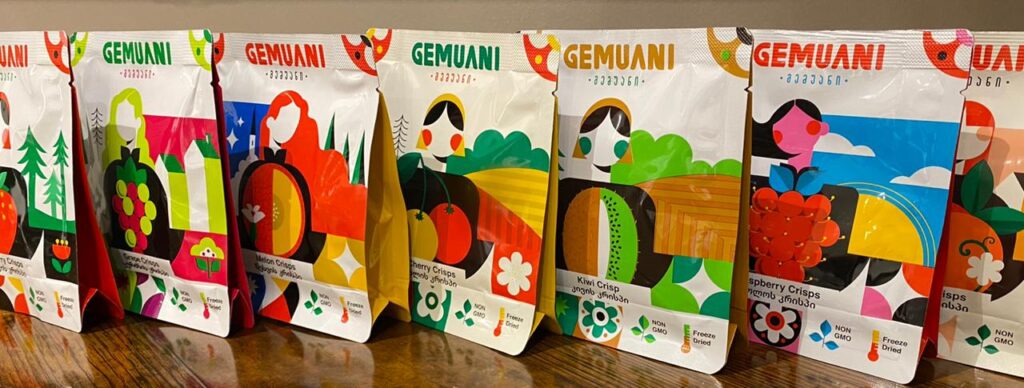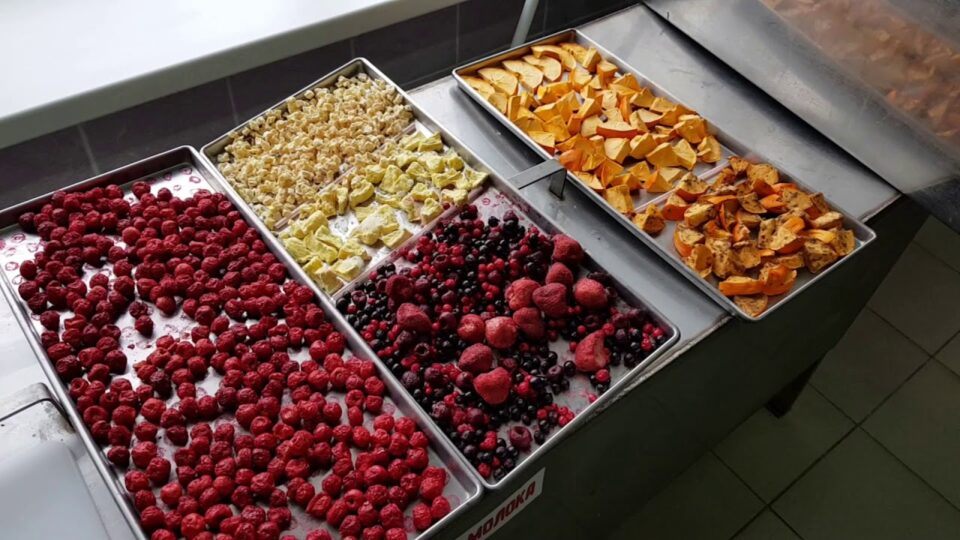Georgian producer of freeze-dried fruits and vegetables Gemuani has completed its rebranding process. After a break of several months, the company will return to the Georgian market with products in new retail packaging by the end of January. Meanwhile, the company did not interrupt export deliveries during the rebranding period and their volume increased significantly over the past year. EastFruit spoke with Gemuani’s founder Nonu Tordia about the reasons for the company’s decision to replace the packaging, what 2020 was like for the company, and what are its plans in the near future.
– What packaging will Gemuani use from now on and what was the reason for the change?
We are switching to new packaging both in terms of material and design. From now on, we will use special aluminized, not vacuum, sealed food bags. First of all, this decision was made based on food safety considerations. The fact is that if the storage conditions are not met, the plastic jars that we used earlier began to breathe so products became exposed to the environment and as a result, the crunchiness of freeze-dried fruits can disappear, etc. Today’s realities show there are no guarantees that during transport and at all warehouses and supermarkets, especially during the summer heat, that the proper temperature (below 22 degrees) will be constantly maintained for our products. With our new packaging, this concern is now irrelevant. Its design also changed and each fruit will have its own character.
As part of our rebranding efforts, we also changed the logo. The first samples of our bagged products will be ready in a few days. As part of our rebranding process last autumn, we suspended supplies to the Georgian market, but we plan to resume them by the end of this month. Naturally, we are talking only about retail (no changes were made to the B2B direction) and so far only for supermarket chains since the HoReCa sector is still on hold from the pandemic. At the first stage, our products will be presented in single-portion sachets at 10-15 grams each. After a few months, 25-40 gram packs will be added to our product line.

– Did the company also suspended export deliveries during the rebranding period?
No, we worked in accordance with long-term agreements. However, we did warn our foreign partners about our change in packaging. Going forward, they will also receive our fruits in bags unless, of course, one of them insists on the previous packaging.
– In general, what were the export trends for your products in 2020?
I can say that over the past year, our product exports have increased by about 30%. We mainly attribute this to the fact that the company has built stable relationships with its partners. During the first two years of our work (Gemuani started selling its products in 2018), there were certification processes to go through and establishing relations with partners. Now, we are at the stage of stable supplies. Our export markets include Europe, the Baltic States, and Russia. I would also like to note that today a large share of our exports is supplying ingredients to the B2B sector, although growth has also been observed in the direction of retail sales to Europe.
Read also: Georgian producer Gemuani: freeze-dried fruits from cinemas to the EU market
– How do you think 2020 was for the company?
I cannot say that we are unhappy with 2020. Of course, in the context of the COVID-19 pandemic, we, like many other manufacturers, had to face certain difficulties such as inviting foreign specialists to repair equipment, sending product samples, audit visits to the enterprise by large companies and partners, and some other questions. Throughout the previous period, we went forward and if I may say so at a frantic pace. This year gave us the opportunity to sit down, think, and stabilize everything.
– Tell us more about Gemuani’s current range of products and prices.
We did not expand the range in 2020. Of the fruits, we still offer freeze-dried apples, peaches, cherries, raspberries, strawberries, gooseberries, currants, feijoa, kiwi, tangerines, and so on. We produced freeze-dried vegetables and herbs only for the HoReCa sector during the periods when it was functioning. We do not carry out retail deliveries of vegetables yet. As for prices, we, as a new enterprise, focused on marketing throughout the past period and did not chase after profits but maintained their stability. Now, we will have to slightly raise prices since many types of raw materials, packaging, logistics services, and electricity charges have risen in price.

– Does the company, in conjunction with the enterprise, have any new projects for this year?
We have many new projects planned, but we have suspended them due to the pandemic. We are waiting for it to end, but we are negotiating with potential partners. I think we will start implementing these projects from 2021.
Gemuani also has extensive agricultural land. Are you happy with its 2020 harvests?
– Our hazelnut orchards are relatively new, but we plan to get the first commercial harvest from them in 2021. We have not yet completed the modernization of our tea plantation. We did get a pretty good kiwi harvest and we used part of the crop as raw material for our company then sold the rest.
***
Sublimation, or freeze-drying, technology means freezing and drying a product such as fruits and vegetables in a vacuum, which retains up to 98% of a product’s vitamins and other nutrients. Gemuani’s high-tech enterprise was built in the Zugdidi municipality of the Samegrelo region in Western Georgia in 2017. Its first products entered the market in 2018. In 2019, Gemuani received the IFS certificate for its enterprise. The company also owns 100 hectares of agricultural land of which 80 hectares are allocated for tea plantations, 10 hectares for hazelnut orchards and 10 hectares for kiwi.
The use of the site materials is free if there is a direct and open for search engines hyperlink to a specific publication of the East-Fruit.com website.




